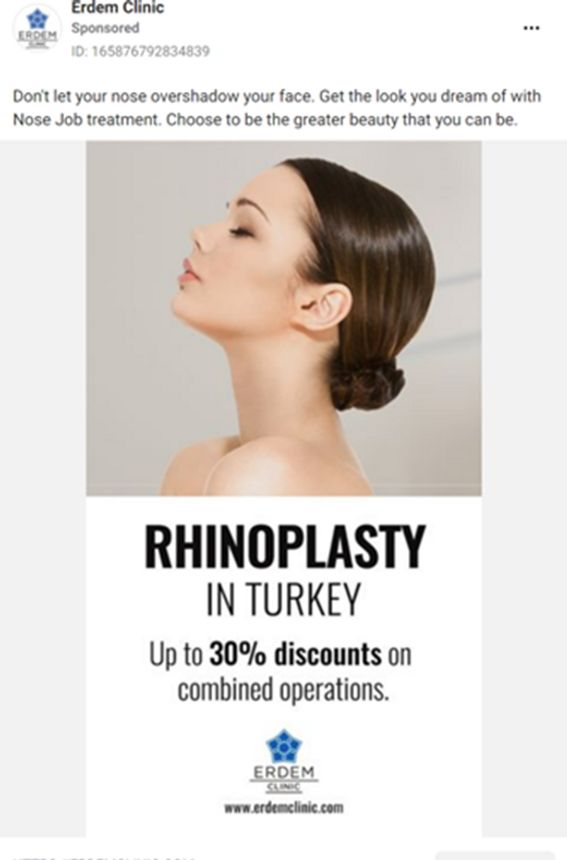Updated: 3rd October 2023
Why has the ASA investigated these ads? And should it have done?
Have you noticed the way that countries keep changing their names? The Czech Republic decided to become Czechia, a name which is confusingly similar to the Russian republic of Chechnya, an entirely different place altogether. Perhaps the Chenchins should bounce the Czechs into court for passing off proceedings. Sounds like Check Mate for the Czechs.
It was characteristically culturally sensitive of the UK's Advertising Standards Authority (ASA) to have a preamble to their adjudications against advertising by three Turkish cosmetic surgery companies explaining that as of June 2023 the Republic of Turkey would now be known as the Republic of Türkiye, but the ASA had used the old name "because it is currently more commonly understood by consumers".
While the ASA may be culturally sensitive, are they engaging in a bit of cultural imperialism, imposing the UK's CAP Code on foreign advertisers? While lawyers are familiar with the concept of "long-arm jurisdiction", we've generally seen the "Country of Origin" Principle prevail in advertising regulation. Historically, this meant that if a foreign advertiser bought UK media, such as TV air time or poster space, then the ASA would have jurisdiction, but not in relation claims on their own websites if they are controlled from outside the UK and did not target UK customers, such as by quoting prices in Sterling, using UK flags and or ".co.uk" domain names.
The situation with social media is more complicated, and the CAP Code sets out the position with a double negative. Part II of the Scope of the Code states as follows (with emphasis added):
II. The Code does not apply to:
c. marketing communications on websites, apps and cross-border platforms (for example, social media platforms or retail platforms) unless they meet at least one of the following criteria:
- Non-paid-for marketing communications from or by marketers with a UK registered company address.
- Marketing communications appearing on websites with a ".uk" top-level domain.
- Paid-for marketing communications from or by marketers targeting people in the UK.
The ASA's position is that these three advertisers had paid Meta to target UK consumers on Facebook, which brought their ads back into the ASA's jurisdiction. So what happens then? Once again, the situation is slightly opaque. The CAP Code says that for non-paid for marketing which targets UK consumers, they will refer the complaint to the self-regulatory organisation (SRO) where the advertiser is based, which will be easier if the relevant SRO is also a member of European Advertising Standards Alliance (EASA). In this case, however, the advertising was paid-for marketing, in which case the CAP Code says if "the ASA considers that it is unable to take action in response to such complaints", it will also refer the relevant EASA member. What is less apparent, however, is that if the ASA thinks it can take action, then it's business as usual and they ill investigate the complaint in the same way as they would a complaint against a UK advertiser.
So why would the ASA think it has the ability to take action against companies based in Turkey, Türkiye or even Timbuktu if they post paid-for ads which breach the CAP Code on Facebook, and which target UK consumers? Because Meta is signed up to the Intermediary and Platform Principles (IPP), which provide the enforcement mechanism for ASA adjudications in these circumstances. Principle 5a of the IPP states as follows:
"On receipt of a relevant notice from the CAP Compliance function, [participating companies will] act swiftly to remove a non-compliant ad that is the subject of a specific breach of the CAP Code as determined by, or directly related to, a published ASA ruling, in instances where the advertiser fails to appropriately amend or withdraw its non-compliant ad."
The ASA is therefore confident that if the three banned posts continue to appear on Facebook, the CAP Compliance team will be able to contact Meta and have them taken down. This would be true for any ad on any of the platforms or other intermediaries that are part to the IPP, regardless of where the advertiser is based. So this currently applies to ads on Adform, Amazon Ads, Google, Index Exchange, Magnite, Meta, Snap, TikTok, Twitter and Yahoo. The initial pilot scheme for the IPP has now concluded, and a final report on its results is due out this autumn, but in the meantime, the participating platforms have all agreed to continue to apply the principles. In the light of these three adjudications, it seems far more likely that the northern leg of HS2 will be cancelled than these principles, which are likely to become a permanent fixture of the CAP Code.
The other interesting point raised in the preamble to the adjudication is that "the ads were identified for investigation following intelligence gathering by our Active Ad Monitoring system, which uses AI to proactively search for online ads that might break the rules" and that it was "part of a wider piece of work on cosmetic surgery abroad." There is no doubt that these ads are seriously problematic, and that the mischief of encouraging consumers to engage in medical tourism for cosmetic surgery is a serious one that should be challenged, but where does this leave the Country of Origin Principle?
What is the problem with the ads?
The three paid-for Facebook ads all promoted cosmetic surgery in Turkey and were branded as "irresponsible" for "trivialising" the decision to undergo invasive cosmetic procedures and for exploiting insecurities around body image.
The ads for AsproMED, Erdem Clinic and ClinicHaus Health were seen on Facebook in May and June 2023 and featured the captions:
"Are you ready to unleash your inner beauty, dear friend? ...Get permanent beauty with Gastric Balloon."
"Don't let your nose overshadow your face. Get the look you dream of with Nose Job treatment. Choose to be the greater beauty that you can be."
"Rhinoplasty surgery, one of the most successful doctors in the world... Fill out the form now for the big summer campaign" – with a "VIP transfer" and "5-star package" included.
The ASA challenged whether: the references to "inner" and "greater" beauty exploited insecurities about body image; trivialised the decision to go under the knife by encouraging consumers to travel abroad and holiday in "the most beautiful city in the world" for the surgery; pressured consumers by asking consumers to "fill in the form now" and by offering "30% discounts on combined operations"; and omitted essential information, such as the requirement for a pre-consultation to assess the suitability of the patient for the procedure – which sometimes may need to take place in person.
How did the advertisers defend their ads?
AsproMED and Erdem Clinic did not reply to the ASA's investigation, but we don't why. Did they even receive the complaint notification? Or did they not accept the ASA's jurisdiction? We will never know.
However, Ersoy Health Services (t/a ClinicHaus Health) said that they were certified by the Turkish government to provide their cosmetic surgeries and claimed it was usual in the industry to include images demonstrating the effects of such cosmetic procedures. This defence is not unreasonable; effectively they are saying that they are governed by laws and regulations of Turkey, not the United Kingdom. In other words, they wanted to rely on the Country of Origin Principle.
Meta apparently replied to the ASA's enquiries, but only to say that they had no comments to make. Nevertheless, the ASA is confident that Meta will assist the ASA with any subsequent enforcement action if the three advertisers fail to comply with the ASA adjudications, in accordance with the IPP.
What did the ASA conclude?
The ASA criticised the ads for having "exploited people's insecurities." In particular, the image of the woman with a small, straight and slightly upturned nose in the Erdem Clinic ad suggested that "having a nose that did not conform to prevailing beauty standards was a source of concern" that could be fixed with cosmetic surgery. The AsproMED ad, on the other hand, featured a slim woman holding a balloon and the references to "inner beauty" put pressure on consumers to conform to body image stereotypes. As an overweight man with a large, hooked nose, I share those concerns, so I am grateful to the ASA for striking this blow on behalf of people like me.
The ASA advised that particular care should be taken when offering promotions for cosmetic surgeries. Whilst the act of offering a promotion it was not irresponsible in itself, the ASA highlighted that the decision to undergo an invasive cosmetic surgical procedure was not something that consumers should take lightly. In the case of Erdem Clinic, the combination of the prominent claim for "up to 30% discounts on combined operations" would pressure consumers into also having other cosmetic surgery procedures at the same time as the nose job being offered.
The ads also all omitted various information, including about the procedure itself, the location and the need for a pre-consultation which would assess the patient's suitability for the procedure and outline essential information such as the recovery time, potential risks and side effects. CAP Guidance on these types of ads states that they should not imply that cosmetic surgeries were "minor procedures" if that was likely to mislead consumers as to the complexity, duration or commitment required from the patient for the pre-consultation, surgery, recovery and post-operative assessments.
The companies have been told that the ads must not appear again in the forms investigated. The ASA also criticised AsproMEd and Erdem Clinic for their "lack of response and apparent disregard for the Code" and reminded them of their responsibility to reply promptly to any future investigations.
Kebabs. (Or key takeaways, to avoid being skewered)
For those familiar with the ASA, these rulings come as no surprise given the number of complaints that have been upheld over the past few years about ads offering cosmetic surgery. Targeting these types of ads at under-18's was banned last year.
With increasing reports in the news of procedures abroad gone wrong, the rulings illustrate that this has not gone unnoticed by the ASA and that it is a high priority area.
And yet while there is no doubt that the ASA is right to be concerned about this kind of advertising, an uncomfortable question remains about the ASA seeking to impose its rules on advertisers based outside the UK.
From the ASA's point of view, the IPP represent a considerable achievement, enable them to tackle misleading paid-for ads on social media which target UK consumers from outside the UK. But from the point of view of these three advertisers, they must have wondered why this regulator from thousands of miles away in the UK thought they had any business investigating their advertising? Have they never seen Gallipoli? We lost. And how would an advertiser in Barnsley, Bolton or Bournemouth feel if the Turkish SRO contacted them to complain about a paid-for post on Facebook targeting Turkish consumers?
The only crumb of comfort for these three Turkish advertisers is that the ASA's main sanction, apart from getting ads pulled, is negative publicity. But presumably the ASA's decisions are not widely read or reported in Turkey, so any reputational damage will be limited.
The advantage of the Country of Origin Principle was that is facilitated international advertising, but from now on advertisers from the United States of America, or any where else in the world, who want to target UK consumers using paid-for advertising on Facebook or other social media platforms are going to have to take advice to ensure that their ads comply with the UK's self-regulatory Code of Advertising Standards.
{
"We told Erdem Clinic to ensure their future ads were socially responsible, by not pressuring consumers into undertaking more cosmetic interventions than they otherwise would and not exploiting insecurities about body image."
https://www.asa.org.uk/rulings/erdem-clinic-a23-1199873-erdem-clinic.html

The content of this article is intended to provide a general guide to the subject matter. Specialist advice should be sought about your specific circumstances.


